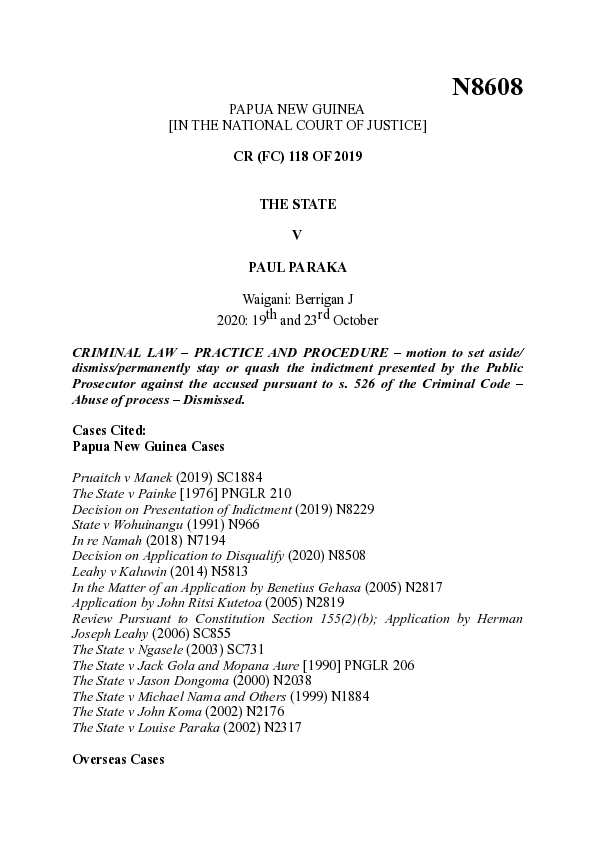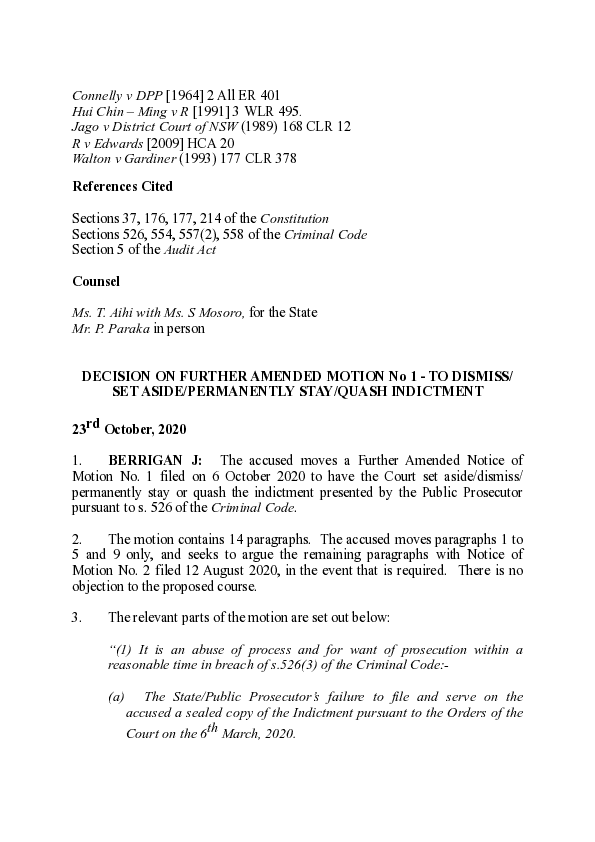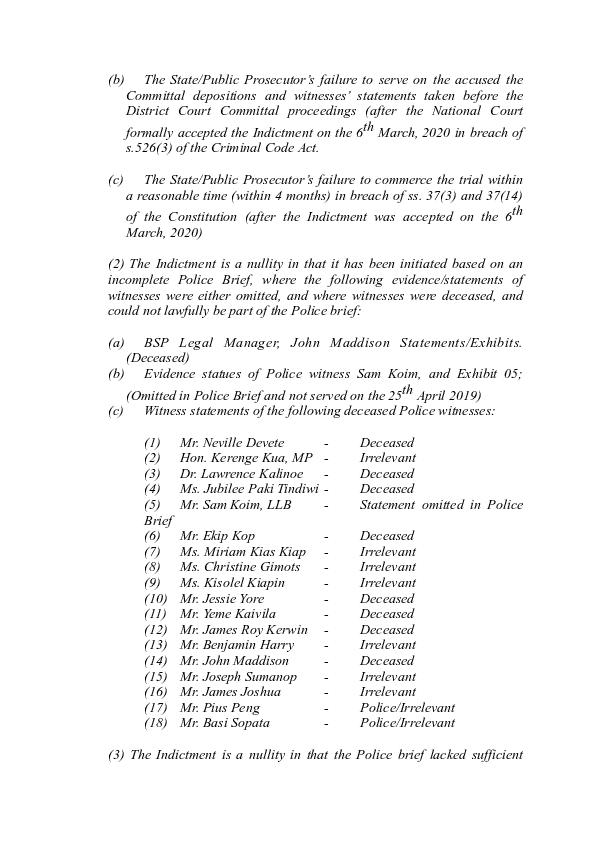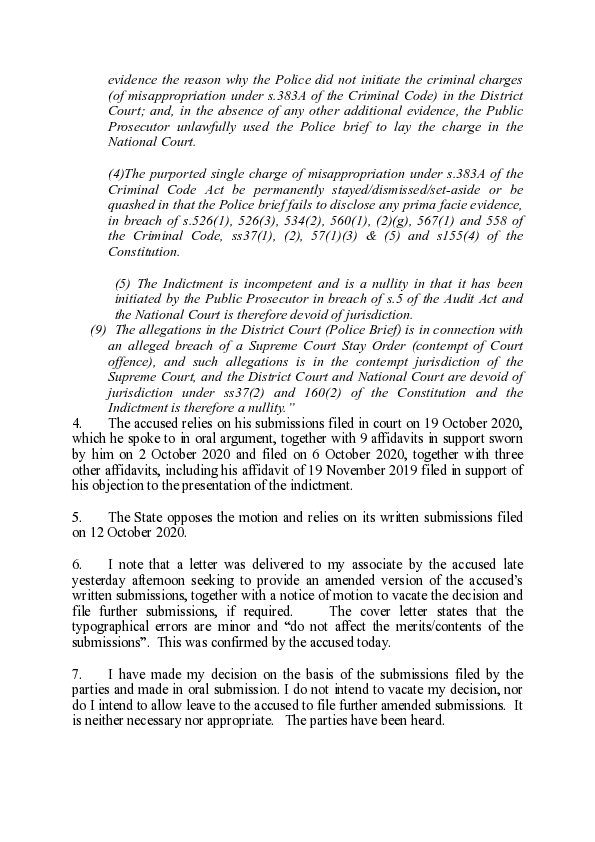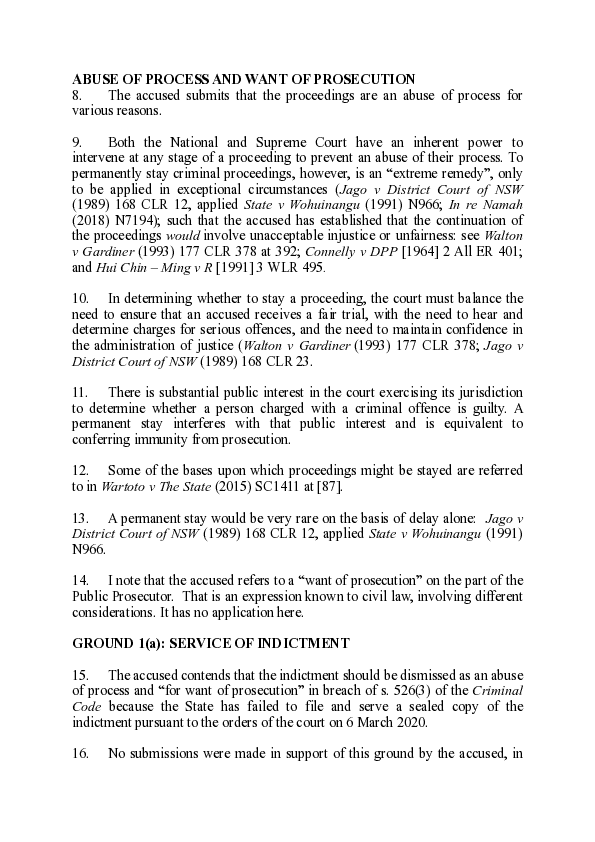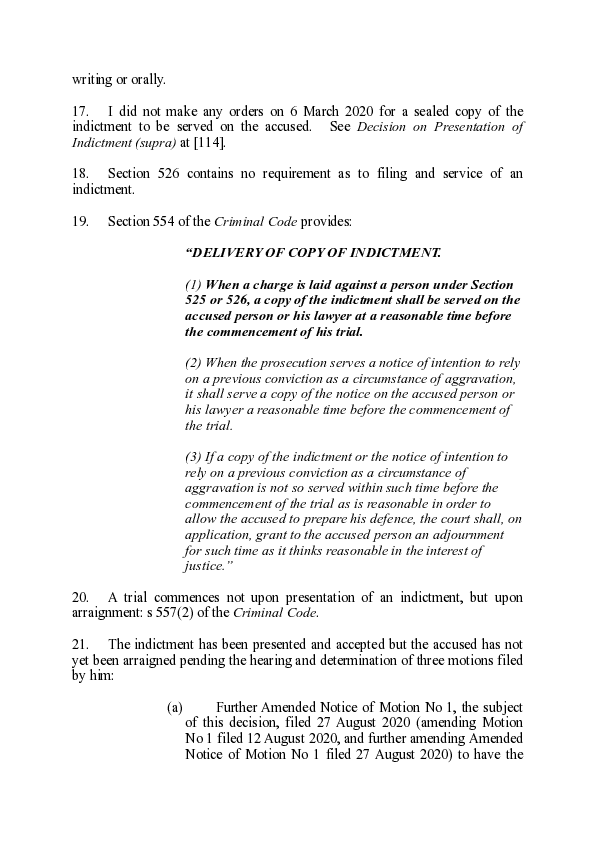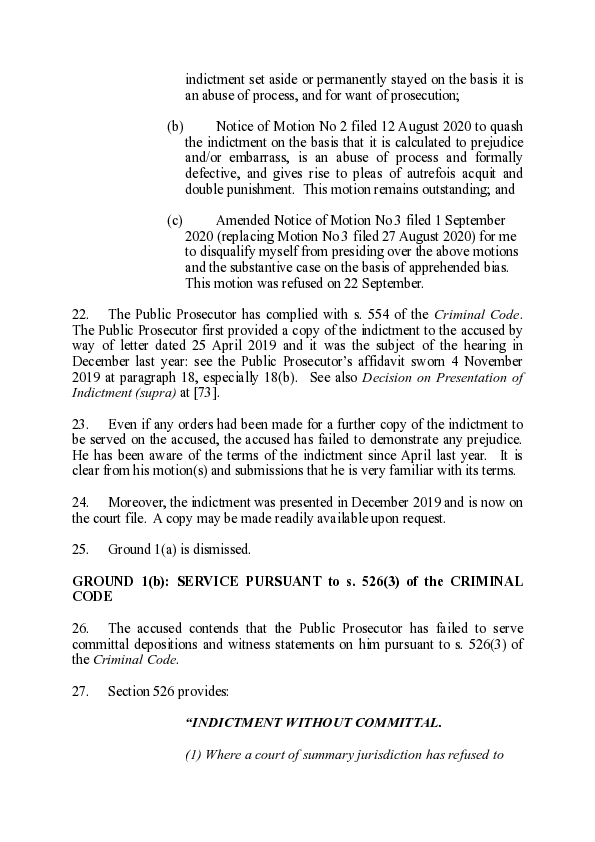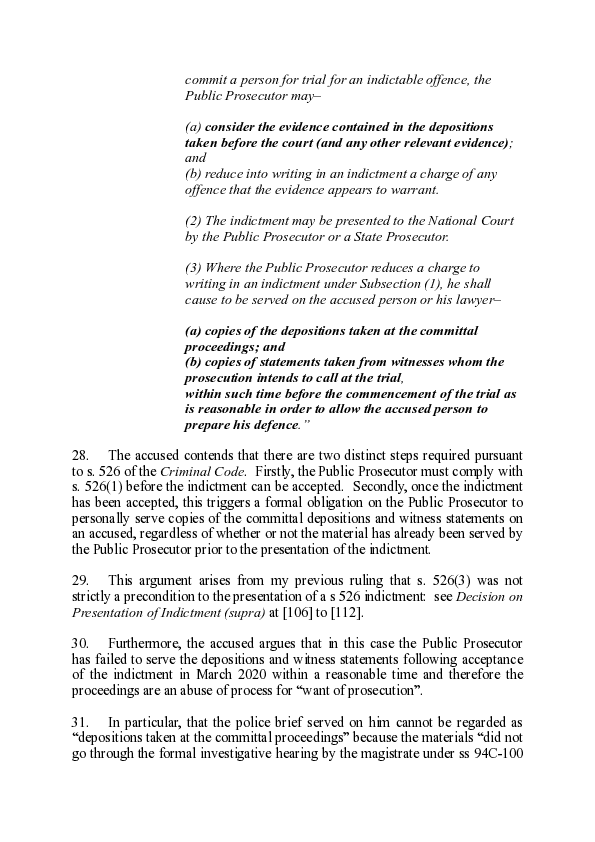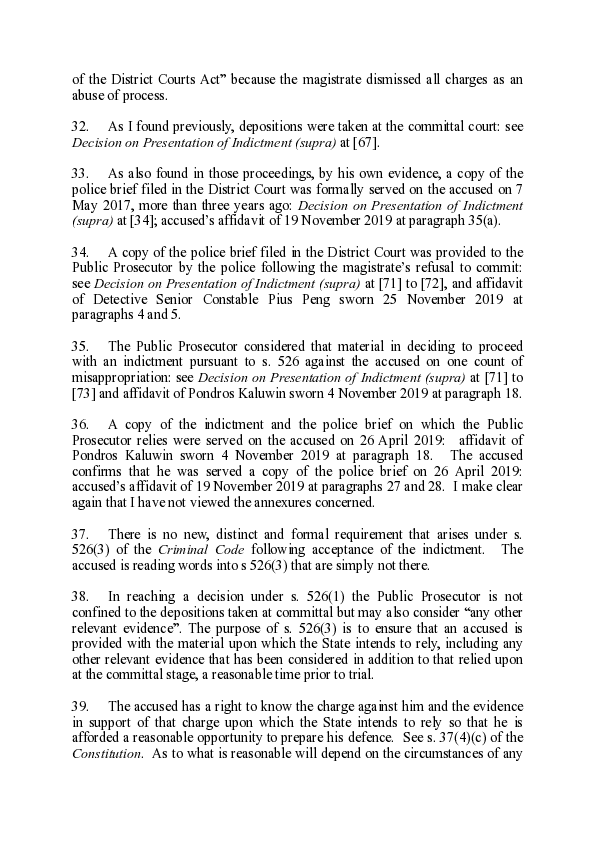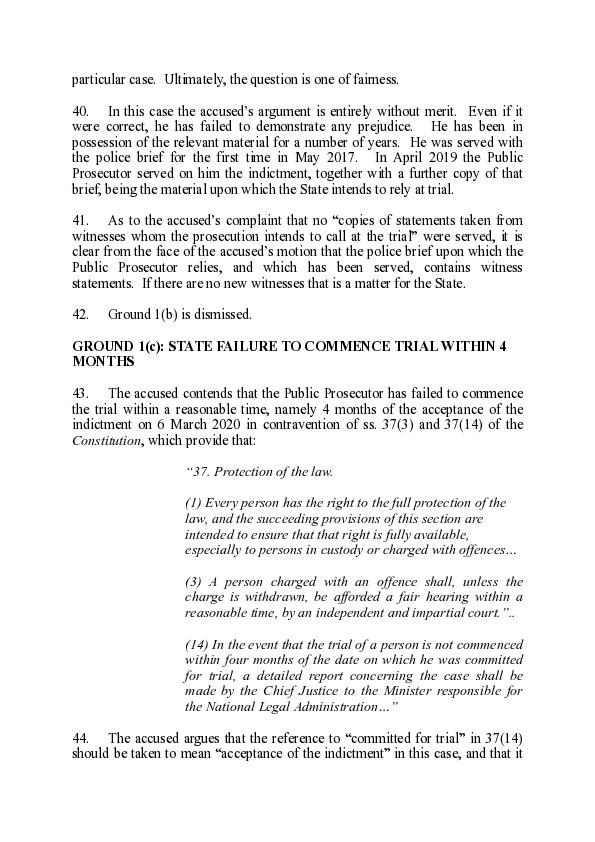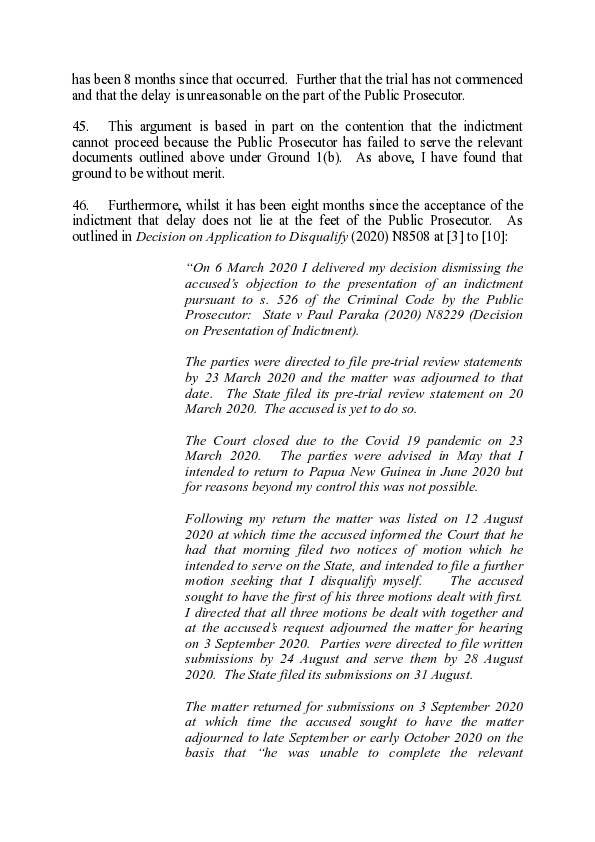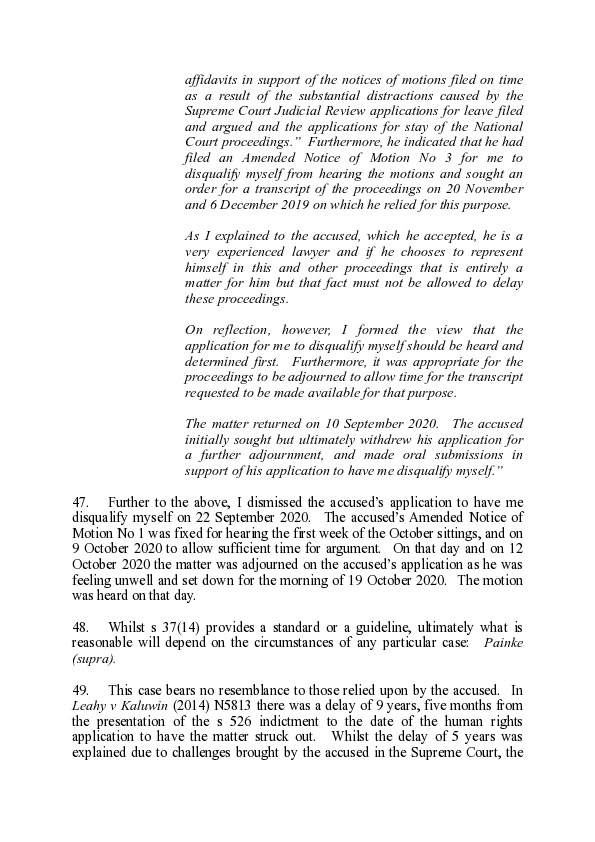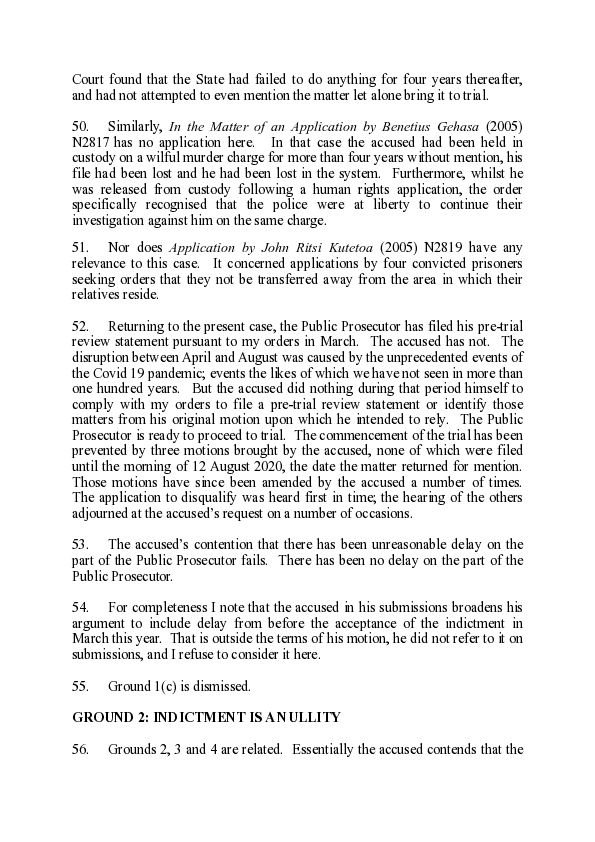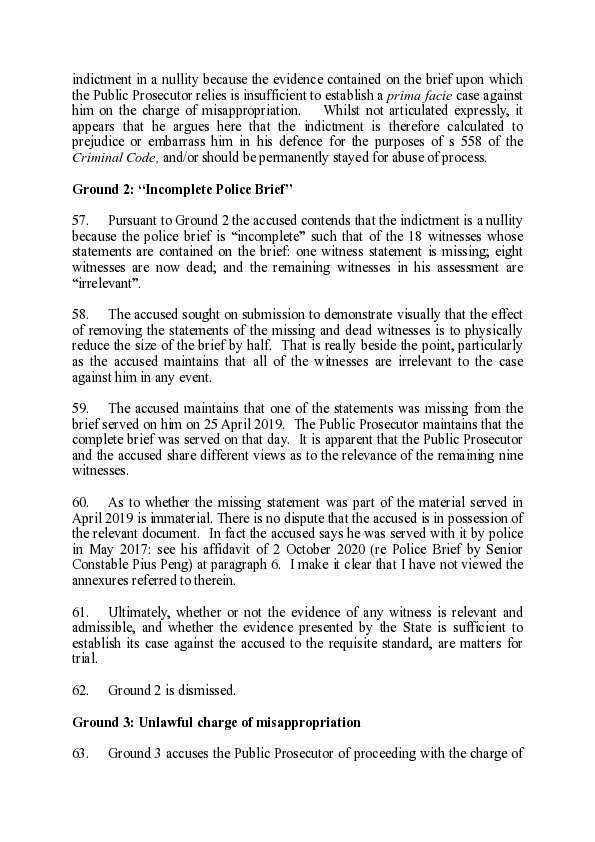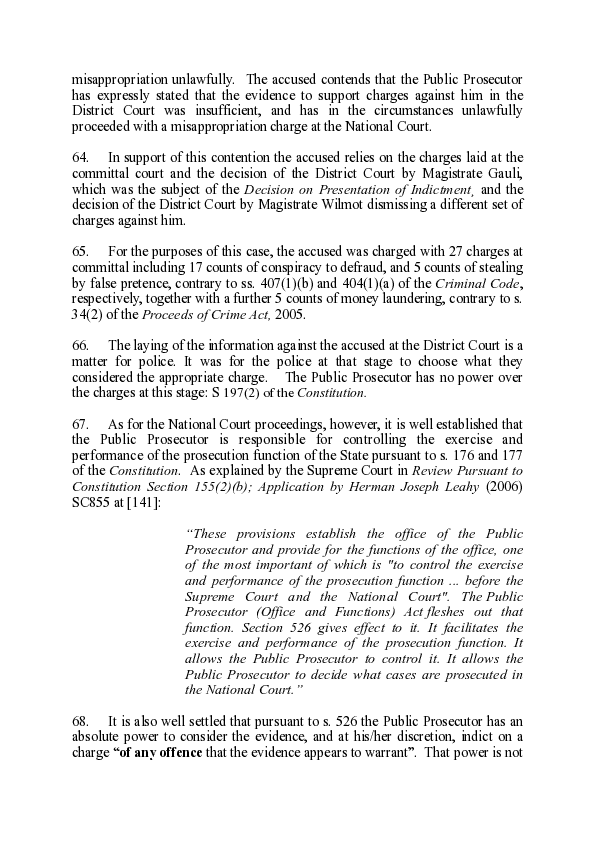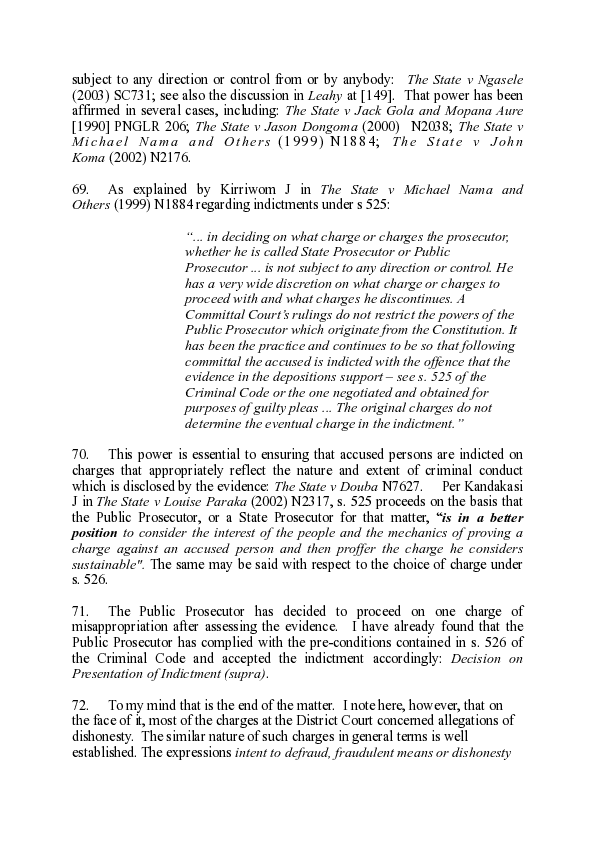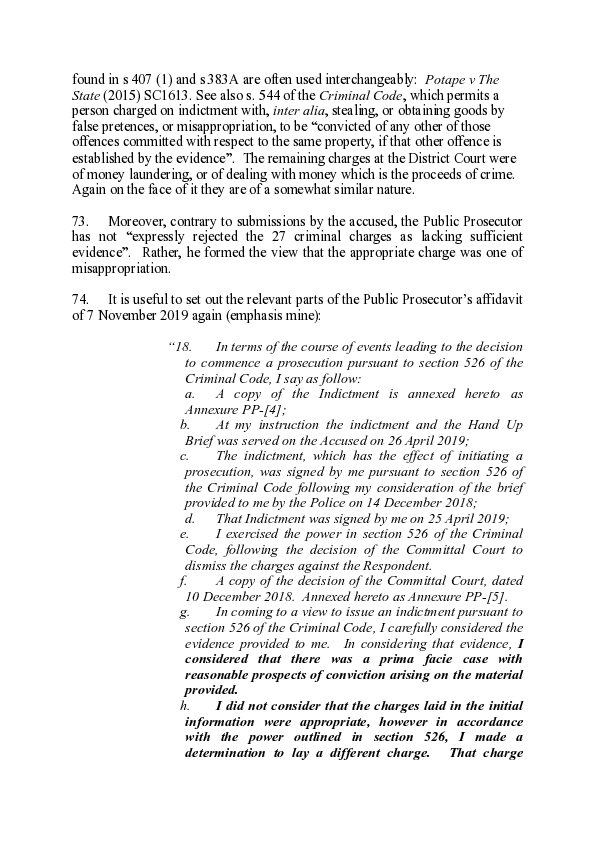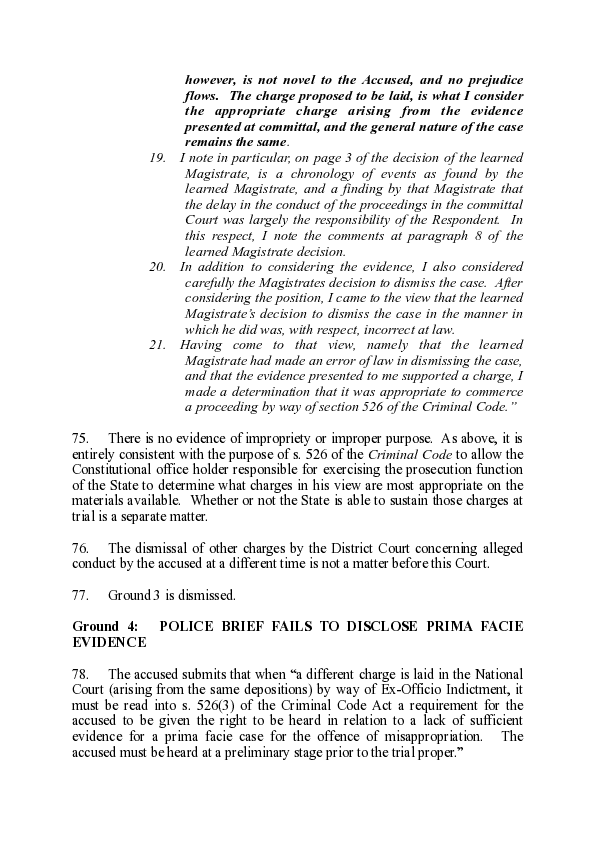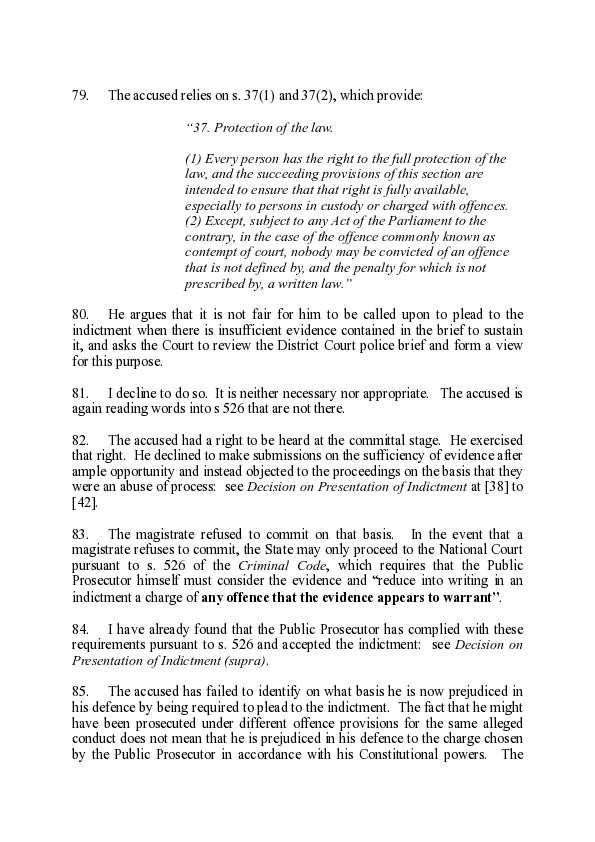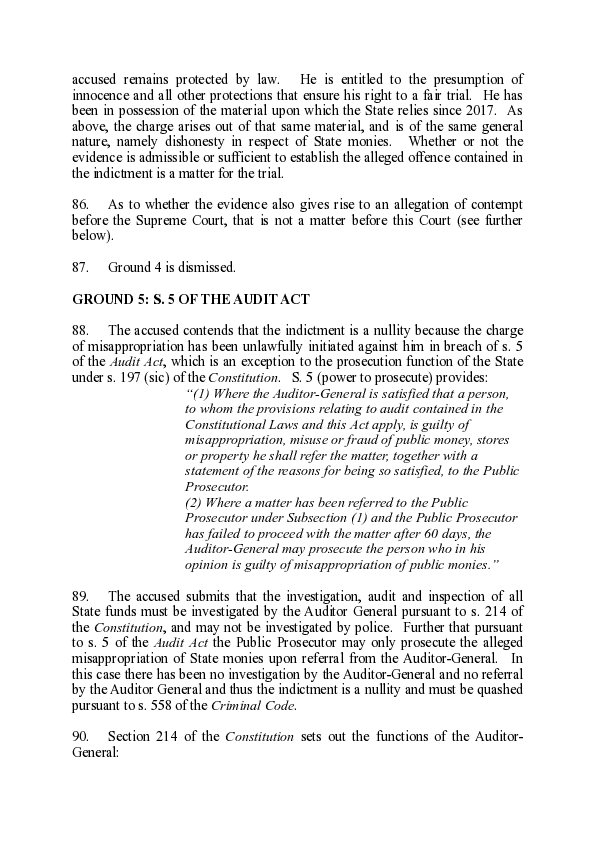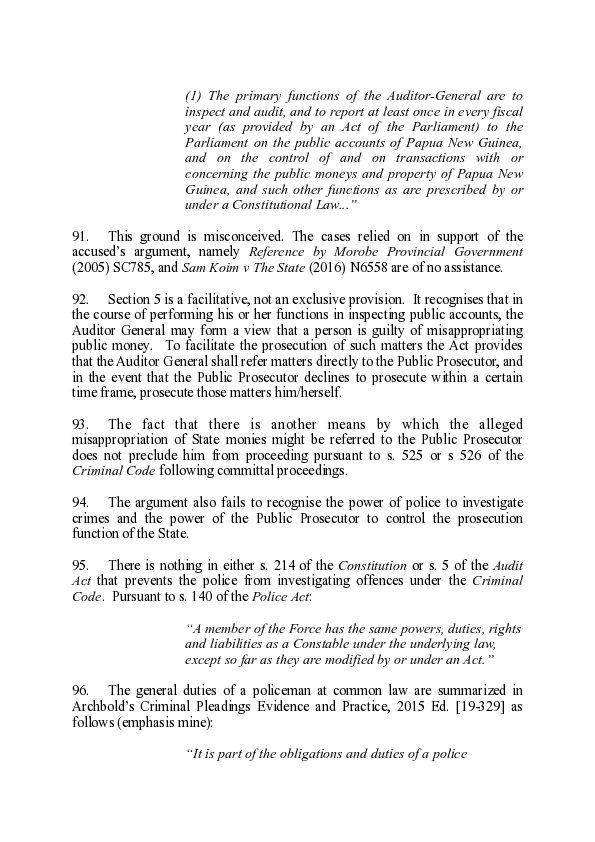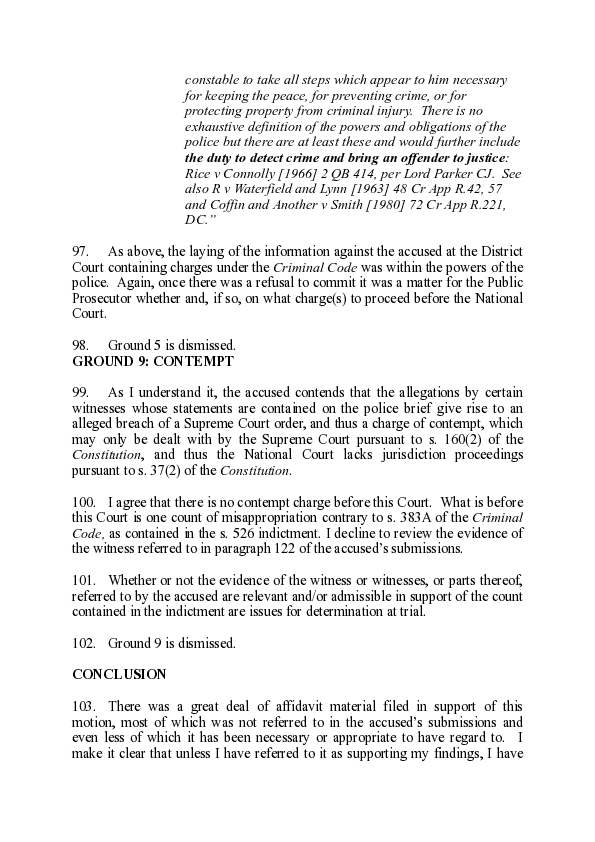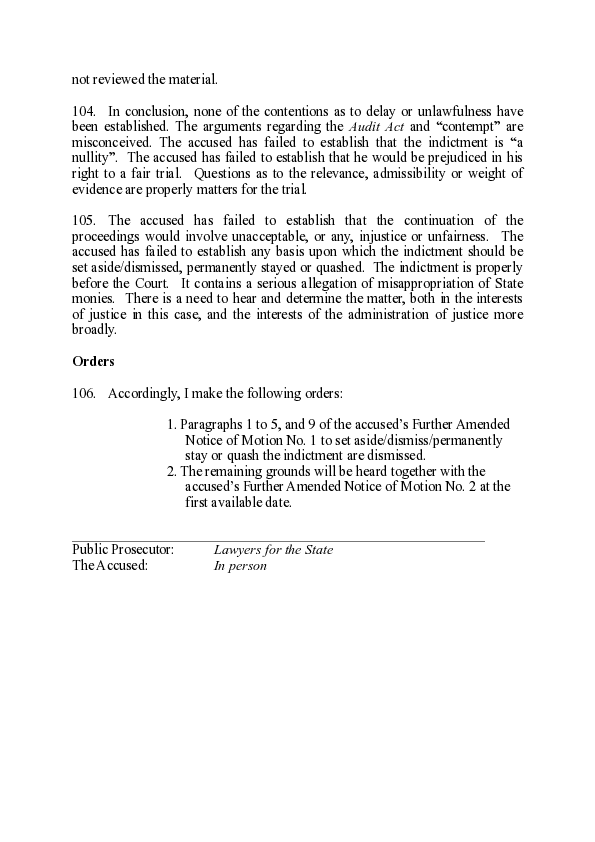Paul Paraka v The State [2020] N8608
Mentions of people and company names in this document
It is not suggested or implied that simply because a person, company or other entity is mentioned in the documents in the database that they have broken the law or otherwise acted improperly. Read our full disclaimer
Document content
-
N8608
PAPUA NEW GUINEA
[IN THE NATIONAL COURT OF JUSTICE]CR (FC) 118 OF 2019
THE STATE
V
PAUL PARAKA
Waigani: Berrigan J
2020: 19th and 23rd OctoberCRIMINAL LAW – PRACTICE AND PROCEDURE – motion to set aside/
dismiss/permanently stay or quash the indictment presented by the Public
Prosecutor against the accused pursuant to s. 526 of the Criminal Code –
Abuse of process – Dismissed.Cases Cited:
Papua New Guinea CasesPruaitch v Manek (2019) SC1884
The State v Painke [1976] PNGLR 210
Decision on Presentation of Indictment (2019) N8229
State v Wohuinangu (1991) N966
In re Namah (2018) N7194
Decision on Application to Disqualify (2020) N8508
Leahy v Kaluwin (2014) N5813
In the Matter of an Application by Benetius Gehasa (2005) N2817
Application by John Ritsi Kutetoa (2005) N2819
Review Pursuant to Constitution Section 155(2)(b); Application by Herman
Joseph Leahy (2006) SC855
The State v Ngasele (2003) SC731
The State v Jack Gola and Mopana Aure [1990] PNGLR 206
The State v Jason Dongoma (2000) N2038
The State v Michael Nama and Others (1999) N1884
The State v John Koma (2002) N2176
The State v Louise Paraka (2002) N2317Overseas Cases
-
Page 2 of 23
-
Connelly v DPP [1964] 2 All ER 401
Hui Chin – Ming v R [1991] 3 WLR 495.
Jago v District Court of NSW (1989) 168 CLR 12
R v Edwards [2009] HCA 20
Walton v Gardiner (1993) 177 CLR 378References Cited
Sections 37, 176, 177, 214 of the Constitution
Sections 526, 554, 557(2), 558 of the Criminal Code
Section 5 of the Audit ActCounsel
Ms. T. Aihi with Ms. S Mosoro, for the State
Mr. P. Paraka in personDECISION ON FURTHER AMENDED MOTION No 1 – TO DISMISS/
SET ASIDE/PERMANENTLY STAY/QUASH INDICTMENT23rd October, 2020
1. BERRIGAN J: The accused moves a Further Amended Notice of
Motion No. 1 filed on 6 October 2020 to have the Court set aside/dismiss/
permanently stay or quash the indictment presented by the Public Prosecutor
pursuant to s. 526 of the Criminal Code.2. The motion contains 14 paragraphs. The accused moves paragraphs 1 to
5 and 9 only, and seeks to argue the remaining paragraphs with Notice of
Motion No. 2 filed 12 August 2020, in the event that is required. There is no
objection to the proposed course.3. The relevant parts of the motion are set out below:
“(1) It is an abuse of process and for want of prosecution within a
reasonable time in breach of s.526(3) of the Criminal Code:-(a) The State/Public Prosecutor’s failure to file and serve on the
accused a sealed copy of the Indictment pursuant to the Orders of the
Court on the 6th March, 2020. -
Page 3 of 23
-
(b) The State/Public Prosecutor’s failure to serve on the accused the
Committal depositions and witnesses’ statements taken before the
District Court Committal proceedings (after the National Court
formally accepted the Indictment on the 6th March, 2020 in breach of
s.526(3) of the Criminal Code Act.(c) The State/Public Prosecutor’s failure to commerce the trial within
a reasonable time (within 4 months) in breach of ss. 37(3) and 37(14)
of the Constitution (after the Indictment was accepted on the 6th
March, 2020)(2) The Indictment is a nullity in that it has been initiated based on an
incomplete Police Brief, where the following evidence/statements of
witnesses were either omitted, and where witnesses were deceased, and
could not lawfully be part of the Police brief:(a) BSP Legal Manager, John Maddison Statements/Exhibits.
(Deceased)
(b) Evidence statues of Police witness Sam Koim, and Exhibit 05;
(Omitted in Police Brief and not served on the 25th April 2019)
(c) Witness statements of the following deceased Police witnesses:(1) Mr. Neville Devete – Deceased
(2) Hon. Kerenge Kua, MP – Irrelevant
(3) Dr. Lawrence Kalinoe – Deceased
(4) Ms. Jubilee Paki Tindiwi – Deceased
(5) Mr. Sam Koim, LLB – Statement omitted in Police
Brief
(6) Mr. Ekip Kop – Deceased
(7) Ms. Miriam Kias Kiap – Irrelevant
(8) Ms. Christine Gimots – Irrelevant
(9) Ms. Kisolel Kiapin – Irrelevant
(10) Mr. Jessie Yore – Deceased
(11) Mr. Yeme Kaivila – Deceased
(12) Mr. James Roy Kerwin – Deceased
(13) Mr. Benjamin Harry – Irrelevant
(14) Mr. John Maddison – Deceased
(15) Mr. Joseph Sumanop – Irrelevant
(16) Mr. James Joshua – Irrelevant
(17) Mr. Pius Peng – Police/Irrelevant
(18) Mr. Basi Sopata – Police/Irrelevant(3) The Indictment is a nullity in that the Police brief lacked sufficient
-
Page 4 of 23
-
evidence the reason why the Police did not initiate the criminal charges
(of misappropriation under s.383A of the Criminal Code) in the District
Court; and, in the absence of any other additional evidence, the Public
Prosecutor unlawfully used the Police brief to lay the charge in the
National Court.(4)The purported single charge of misappropriation under s.383A of the
Criminal Code Act be permanently stayed/dismissed/set-aside or be
quashed in that the Police brief fails to disclose any prima facie evidence,
in breach of s.526(1), 526(3), 534(2), 560(1), (2)(g), 567(1) and 558 of
the Criminal Code, ss37(1), (2), 57(1)(3) & (5) and s155(4) of the
Constitution.(5) The Indictment is incompetent and is a nullity in that it has been
initiated by the Public Prosecutor in breach of s.5 of the Audit Act and
the National Court is therefore devoid of jurisdiction.
(9) The allegations in the District Court (Police Brief) is in connection with
an alleged breach of a Supreme Court Stay Order (contempt of Court
offence), and such allegations is in the contempt jurisdiction of the
Supreme Court, and the District Court and National Court are devoid of
jurisdiction under ss37(2) and 160(2) of the Constitution and the
Indictment is therefore a nullity.”
4. The accused relies on his submissions filed in court on 19 October 2020,
which he spoke to in oral argument, together with 9 affidavits in support sworn
by him on 2 October 2020 and filed on 6 October 2020, together with three
other affidavits, including his affidavit of 19 November 2019 filed in support of
his objection to the presentation of the indictment.5. The State opposes the motion and relies on its written submissions filed
on 12 October 2020.6. I note that a letter was delivered to my associate by the accused late
yesterday afternoon seeking to provide an amended version of the accused’s
written submissions, together with a notice of motion to vacate the decision and
file further submissions, if required. The cover letter states that the
typographical errors are minor and “do not affect the merits/contents of the
submissions”. This was confirmed by the accused today.7. I have made my decision on the basis of the submissions filed by the
parties and made in oral submission. I do not intend to vacate my decision, nor
do I intend to allow leave to the accused to file further amended submissions. It
is neither necessary nor appropriate. The parties have been heard. -
Page 5 of 23
-
ABUSE OF PROCESS AND WANT OF PROSECUTION
8. The accused submits that the proceedings are an abuse of process for
various reasons.9. Both the National and Supreme Court have an inherent power to
intervene at any stage of a proceeding to prevent an abuse of their process. To
permanently stay criminal proceedings, however, is an “extreme remedy”, only
to be applied in exceptional circumstances (Jago v District Court of NSW
(1989) 168 CLR 12, applied State v Wohuinangu (1991) N966; In re Namah
(2018) N7194); such that the accused has established that the continuation of
the proceedings would involve unacceptable injustice or unfairness: see Walton
v Gardiner (1993) 177 CLR 378 at 392; Connelly v DPP [1964] 2 All ER 401;
and Hui Chin – Ming v R [1991] 3 WLR 495.10. In determining whether to stay a proceeding, the court must balance the
need to ensure that an accused receives a fair trial, with the need to hear and
determine charges for serious offences, and the need to maintain confidence in
the administration of justice (Walton v Gardiner (1993) 177 CLR 378; Jago v
District Court of NSW (1989) 168 CLR 23.11. There is substantial public interest in the court exercising its jurisdiction
to determine whether a person charged with a criminal offence is guilty. A
permanent stay interferes with that public interest and is equivalent to
conferring immunity from prosecution.12. Some of the bases upon which proceedings might be stayed are referred
to in Wartoto v The State (2015) SC1411 at [87].13. A permanent stay would be very rare on the basis of delay alone: Jago v
District Court of NSW (1989) 168 CLR 12, applied State v Wohuinangu (1991)
N966.14. I note that the accused refers to a “want of prosecution” on the part of the
Public Prosecutor. That is an expression known to civil law, involving different
considerations. It has no application here.GROUND 1(a): SERVICE OF INDICTMENT
15. The accused contends that the indictment should be dismissed as an abuse
of process and “for want of prosecution” in breach of s. 526(3) of the Criminal
Code because the State has failed to file and serve a sealed copy of the
indictment pursuant to the orders of the court on 6 March 2020.16. No submissions were made in support of this ground by the accused, in
-
Page 6 of 23
-
writing or orally.
17. I did not make any orders on 6 March 2020 for a sealed copy of the
indictment to be served on the accused. See Decision on Presentation of
Indictment (supra) at [114].18. Section 526 contains no requirement as to filing and service of an
indictment.19. Section 554 of the Criminal Code provides:
“DELIVERY OF COPY OF INDICTMENT.
(1) When a charge is laid against a person under Section
525 or 526, a copy of the indictment shall be served on the
accused person or his lawyer at a reasonable time before
the commencement of his trial.(2) When the prosecution serves a notice of intention to rely
on a previous conviction as a circumstance of aggravation,
it shall serve a copy of the notice on the accused person or
his lawyer a reasonable time before the commencement of
the trial.(3) If a copy of the indictment or the notice of intention to
rely on a previous conviction as a circumstance of
aggravation is not so served within such time before the
commencement of the trial as is reasonable in order to
allow the accused to prepare his defence, the court shall, on
application, grant to the accused person an adjournment
for such time as it thinks reasonable in the interest of
justice.”20. A trial commences not upon presentation of an indictment, but upon
arraignment: s 557(2) of the Criminal Code.21. The indictment has been presented and accepted but the accused has not
yet been arraigned pending the hearing and determination of three motions filed
by him:(a) Further Amended Notice of Motion No 1, the subject
of this decision, filed 27 August 2020 (amending Motion
No 1 filed 12 August 2020, and further amending Amended
Notice of Motion No 1 filed 27 August 2020) to have the -
Page 7 of 23
-
indictment set aside or permanently stayed on the basis it is
an abuse of process, and for want of prosecution;(b) Notice of Motion No 2 filed 12 August 2020 to quash
the indictment on the basis that it is calculated to prejudice
and/or embarrass, is an abuse of process and formally
defective, and gives rise to pleas of autrefois acquit and
double punishment. This motion remains outstanding; and(c) Amended Notice of Motion No 3 filed 1 September
2020 (replacing Motion No 3 filed 27 August 2020) for me
to disqualify myself from presiding over the above motions
and the substantive case on the basis of apprehended bias.
This motion was refused on 22 September.22. The Public Prosecutor has complied with s. 554 of the Criminal Code.
The Public Prosecutor first provided a copy of the indictment to the accused by
way of letter dated 25 April 2019 and it was the subject of the hearing in
December last year: see the Public Prosecutor’s affidavit sworn 4 November
2019 at paragraph 18, especially 18(b). See also Decision on Presentation of
Indictment (supra) at [73].23. Even if any orders had been made for a further copy of the indictment to
be served on the accused, the accused has failed to demonstrate any prejudice.
He has been aware of the terms of the indictment since April last year. It is
clear from his motion(s) and submissions that he is very familiar with its terms.24. Moreover, the indictment was presented in December 2019 and is now on
the court file. A copy may be made readily available upon request.25. Ground 1(a) is dismissed.
GROUND 1(b): SERVICE PURSUANT to s. 526(3) of the CRIMINAL
CODE26. The accused contends that the Public Prosecutor has failed to serve
committal depositions and witness statements on him pursuant to s. 526(3) of
the Criminal Code.27. Section 526 provides:
“INDICTMENT WITHOUT COMMITTAL.
(1) Where a court of summary jurisdiction has refused to
-
Page 8 of 23
-
commit a person for trial for an indictable offence, the
Public Prosecutor may–(a) consider the evidence contained in the depositions
taken before the court (and any other relevant evidence);
and
(b) reduce into writing in an indictment a charge of any
offence that the evidence appears to warrant.(2) The indictment may be presented to the National Court
by the Public Prosecutor or a State Prosecutor.(3) Where the Public Prosecutor reduces a charge to
writing in an indictment under Subsection (1), he shall
cause to be served on the accused person or his lawyer–(a) copies of the depositions taken at the committal
proceedings; and
(b) copies of statements taken from witnesses whom the
prosecution intends to call at the trial,
within such time before the commencement of the trial as
is reasonable in order to allow the accused person to
prepare his defence.”28. The accused contends that there are two distinct steps required pursuant
to s. 526 of the Criminal Code. Firstly, the Public Prosecutor must comply with
s. 526(1) before the indictment can be accepted. Secondly, once the indictment
has been accepted, this triggers a formal obligation on the Public Prosecutor to
personally serve copies of the committal depositions and witness statements on
an accused, regardless of whether or not the material has already been served by
the Public Prosecutor prior to the presentation of the indictment.29. This argument arises from my previous ruling that s. 526(3) was not
strictly a precondition to the presentation of a s 526 indictment: see Decision on
Presentation of Indictment (supra) at [106] to [112].30. Furthermore, the accused argues that in this case the Public Prosecutor
has failed to serve the depositions and witness statements following acceptance
of the indictment in March 2020 within a reasonable time and therefore the
proceedings are an abuse of process for “want of prosecution”.31. In particular, that the police brief served on him cannot be regarded as
“depositions taken at the committal proceedings” because the materials “did not
go through the formal investigative hearing by the magistrate under ss 94C-100 -
Page 9 of 23
-
of the District Courts Act” because the magistrate dismissed all charges as an
abuse of process.32. As I found previously, depositions were taken at the committal court: see
Decision on Presentation of Indictment (supra) at [67].33. As also found in those proceedings, by his own evidence, a copy of the
police brief filed in the District Court was formally served on the accused on 7
May 2017, more than three years ago: Decision on Presentation of Indictment
(supra) at [34]; accused’s affidavit of 19 November 2019 at paragraph 35(a).34. A copy of the police brief filed in the District Court was provided to the
Public Prosecutor by the police following the magistrate’s refusal to commit:
see Decision on Presentation of Indictment (supra) at [71] to [72], and affidavit
of Detective Senior Constable Pius Peng sworn 25 November 2019 at
paragraphs 4 and 5.35. The Public Prosecutor considered that material in deciding to proceed
with an indictment pursuant to s. 526 against the accused on one count of
misappropriation: see Decision on Presentation of Indictment (supra) at [71] to
[73] and affidavit of Pondros Kaluwin sworn 4 November 2019 at paragraph 18.36. A copy of the indictment and the police brief on which the Public
Prosecutor relies were served on the accused on 26 April 2019: affidavit of
Pondros Kaluwin sworn 4 November 2019 at paragraph 18. The accused
confirms that he was served a copy of the police brief on 26 April 2019:
accused’s affidavit of 19 November 2019 at paragraphs 27 and 28. I make clear
again that I have not viewed the annexures concerned.37. There is no new, distinct and formal requirement that arises under s.
526(3) of the Criminal Code following acceptance of the indictment. The
accused is reading words into s 526(3) that are simply not there.38. In reaching a decision under s. 526(1) the Public Prosecutor is not
confined to the depositions taken at committal but may also consider “any other
relevant evidence”. The purpose of s. 526(3) is to ensure that an accused is
provided with the material upon which the State intends to rely, including any
other relevant evidence that has been considered in addition to that relied upon
at the committal stage, a reasonable time prior to trial.39. The accused has a right to know the charge against him and the evidence
in support of that charge upon which the State intends to rely so that he is
afforded a reasonable opportunity to prepare his defence. See s. 37(4)(c) of the
Constitution. As to what is reasonable will depend on the circumstances of any -
Page 10 of 23
-
particular case. Ultimately, the question is one of fairness.
40. In this case the accused’s argument is entirely without merit. Even if it
were correct, he has failed to demonstrate any prejudice. He has been in
possession of the relevant material for a number of years. He was served with
the police brief for the first time in May 2017. In April 2019 the Public
Prosecutor served on him the indictment, together with a further copy of that
brief, being the material upon which the State intends to rely at trial.41. As to the accused’s complaint that no “copies of statements taken from
witnesses whom the prosecution intends to call at the trial” were served, it is
clear from the face of the accused’s motion that the police brief upon which the
Public Prosecutor relies, and which has been served, contains witness
statements. If there are no new witnesses that is a matter for the State.42. Ground 1(b) is dismissed.
GROUND 1(c): STATE FAILURE TO COMMENCE TRIAL WITHIN 4
MONTHS43. The accused contends that the Public Prosecutor has failed to commence
the trial within a reasonable time, namely 4 months of the acceptance of the
indictment on 6 March 2020 in contravention of ss. 37(3) and 37(14) of the
Constitution, which provide that:“37. Protection of the law.
(1) Every person has the right to the full protection of the
law, and the succeeding provisions of this section are
intended to ensure that that right is fully available,
especially to persons in custody or charged with offences…(3) A person charged with an offence shall, unless the
charge is withdrawn, be afforded a fair hearing within a
reasonable time, by an independent and impartial court.”..(14) In the event that the trial of a person is not commenced
within four months of the date on which he was committed
for trial, a detailed report concerning the case shall be
made by the Chief Justice to the Minister responsible for
the National Legal Administration…”44. The accused argues that the reference to “committed for trial” in 37(14)
should be taken to mean “acceptance of the indictment” in this case, and that it -
Page 11 of 23
-
has been 8 months since that occurred. Further that the trial has not commenced
and that the delay is unreasonable on the part of the Public Prosecutor.45. This argument is based in part on the contention that the indictment
cannot proceed because the Public Prosecutor has failed to serve the relevant
documents outlined above under Ground 1(b). As above, I have found that
ground to be without merit.46. Furthermore, whilst it has been eight months since the acceptance of the
indictment that delay does not lie at the feet of the Public Prosecutor. As
outlined in Decision on Application to Disqualify (2020) N8508 at [3] to [10]:“On 6 March 2020 I delivered my decision dismissing the
accused’s objection to the presentation of an indictment
pursuant to s. 526 of the Criminal Code by the Public
Prosecutor: State v Paul Paraka (2020) N8229 (Decision
on Presentation of Indictment).The parties were directed to file pre-trial review statements
by 23 March 2020 and the matter was adjourned to that
date. The State filed its pre-trial review statement on 20
March 2020. The accused is yet to do so.The Court closed due to the Covid 19 pandemic on 23
March 2020. The parties were advised in May that I
intended to return to Papua New Guinea in June 2020 but
for reasons beyond my control this was not possible.Following my return the matter was listed on 12 August
2020 at which time the accused informed the Court that he
had that morning filed two notices of motion which he
intended to serve on the State, and intended to file a further
motion seeking that I disqualify myself. The accused
sought to have the first of his three motions dealt with first.
I directed that all three motions be dealt with together and
at the accused’s request adjourned the matter for hearing
on 3 September 2020. Parties were directed to file written
submissions by 24 August and serve them by 28 August
2020. The State filed its submissions on 31 August.The matter returned for submissions on 3 September 2020
at which time the accused sought to have the matter
adjourned to late September or early October 2020 on the
basis that “he was unable to complete the relevant -
Page 12 of 23
-
affidavits in support of the notices of motions filed on time
as a result of the substantial distractions caused by the
Supreme Court Judicial Review applications for leave filed
and argued and the applications for stay of the National
Court proceedings.” Furthermore, he indicated that he had
filed an Amended Notice of Motion No 3 for me to
disqualify myself from hearing the motions and sought an
order for a transcript of the proceedings on 20 November
and 6 December 2019 on which he relied for this purpose.As I explained to the accused, which he accepted, he is a
very experienced lawyer and if he chooses to represent
himself in this and other proceedings that is entirely a
matter for him but that fact must not be allowed to delay
these proceedings.On reflection, however, I formed the view that the
application for me to disqualify myself should be heard and
determined first. Furthermore, it was appropriate for the
proceedings to be adjourned to allow time for the transcript
requested to be made available for that purpose.The matter returned on 10 September 2020. The accused
initially sought but ultimately withdrew his application for
a further adjournment, and made oral submissions in
support of his application to have me disqualify myself.”47. Further to the above, I dismissed the accused’s application to have me
disqualify myself on 22 September 2020. The accused’s Amended Notice of
Motion No 1 was fixed for hearing the first week of the October sittings, and on
9 October 2020 to allow sufficient time for argument. On that day and on 12
October 2020 the matter was adjourned on the accused’s application as he was
feeling unwell and set down for the morning of 19 October 2020. The motion
was heard on that day.48. Whilst s 37(14) provides a standard or a guideline, ultimately what is
reasonable will depend on the circumstances of any particular case: Painke
(supra).49. This case bears no resemblance to those relied upon by the accused. In
Leahy v Kaluwin (2014) N5813 there was a delay of 9 years, five months from
the presentation of the s 526 indictment to the date of the human rights
application to have the matter struck out. Whilst the delay of 5 years was
explained due to challenges brought by the accused in the Supreme Court, the -
Page 13 of 23
-
Court found that the State had failed to do anything for four years thereafter,
and had not attempted to even mention the matter let alone bring it to trial.50. Similarly, In the Matter of an Application by Benetius Gehasa (2005)
N2817 has no application here. In that case the accused had been held in
custody on a wilful murder charge for more than four years without mention, his
file had been lost and he had been lost in the system. Furthermore, whilst he
was released from custody following a human rights application, the order
specifically recognised that the police were at liberty to continue their
investigation against him on the same charge.
51. Nor does Application by John Ritsi Kutetoa (2005) N2819 have any
relevance to this case. It concerned applications by four convicted prisoners
seeking orders that they not be transferred away from the area in which their
relatives reside.52. Returning to the present case, the Public Prosecutor has filed his pre-trial
review statement pursuant to my orders in March. The accused has not. The
disruption between April and August was caused by the unprecedented events of
the Covid 19 pandemic; events the likes of which we have not seen in more than
one hundred years. But the accused did nothing during that period himself to
comply with my orders to file a pre-trial review statement or identify those
matters from his original motion upon which he intended to rely. The Public
Prosecutor is ready to proceed to trial. The commencement of the trial has been
prevented by three motions brought by the accused, none of which were filed
until the morning of 12 August 2020, the date the matter returned for mention.
Those motions have since been amended by the accused a number of times.
The application to disqualify was heard first in time; the hearing of the others
adjourned at the accused’s request on a number of occasions.53. The accused’s contention that there has been unreasonable delay on the
part of the Public Prosecutor fails. There has been no delay on the part of the
Public Prosecutor.54. For completeness I note that the accused in his submissions broadens his
argument to include delay from before the acceptance of the indictment in
March this year. That is outside the terms of his motion, he did not refer to it on
submissions, and I refuse to consider it here.55. Ground 1(c) is dismissed.
GROUND 2: INDICTMENT IS A NULLITY
56. Grounds 2, 3 and 4 are related. Essentially the accused contends that the
-
Page 14 of 23
-
indictment in a nullity because the evidence contained on the brief upon which
the Public Prosecutor relies is insufficient to establish a prima facie case against
him on the charge of misappropriation. Whilst not articulated expressly, it
appears that he argues here that the indictment is therefore calculated to
prejudice or embarrass him in his defence for the purposes of s 558 of the
Criminal Code, and/or should be permanently stayed for abuse of process.Ground 2: “Incomplete Police Brief”
57. Pursuant to Ground 2 the accused contends that the indictment is a nullity
because the police brief is “incomplete” such that of the 18 witnesses whose
statements are contained on the brief: one witness statement is missing; eight
witnesses are now dead; and the remaining witnesses in his assessment are
“irrelevant”.58. The accused sought on submission to demonstrate visually that the effect
of removing the statements of the missing and dead witnesses is to physically
reduce the size of the brief by half. That is really beside the point, particularly
as the accused maintains that all of the witnesses are irrelevant to the case
against him in any event.59. The accused maintains that one of the statements was missing from the
brief served on him on 25 April 2019. The Public Prosecutor maintains that the
complete brief was served on that day. It is apparent that the Public Prosecutor
and the accused share different views as to the relevance of the remaining nine
witnesses.60. As to whether the missing statement was part of the material served in
April 2019 is immaterial. There is no dispute that the accused is in possession of
the relevant document. In fact the accused says he was served with it by police
in May 2017: see his affidavit of 2 October 2020 (re Police Brief by Senior
Constable Pius Peng) at paragraph 6. I make it clear that I have not viewed the
annexures referred to therein.61. Ultimately, whether or not the evidence of any witness is relevant and
admissible, and whether the evidence presented by the State is sufficient to
establish its case against the accused to the requisite standard, are matters for
trial.62. Ground 2 is dismissed.
Ground 3: Unlawful charge of misappropriation
63. Ground 3 accuses the Public Prosecutor of proceeding with the charge of
-
Page 15 of 23
-
misappropriation unlawfully. The accused contends that the Public Prosecutor
has expressly stated that the evidence to support charges against him in the
District Court was insufficient, and has in the circumstances unlawfully
proceeded with a misappropriation charge at the National Court.64. In support of this contention the accused relies on the charges laid at the
committal court and the decision of the District Court by Magistrate Gauli,
which was the subject of the Decision on Presentation of Indictment ̧ and the
decision of the District Court by Magistrate Wilmot dismissing a different set of
charges against him.65. For the purposes of this case, the accused was charged with 27 charges at
committal including 17 counts of conspiracy to defraud, and 5 counts of stealing
by false pretence, contrary to ss. 407(1)(b) and 404(1)(a) of the Criminal Code,
respectively, together with a further 5 counts of money laundering, contrary to s.
34(2) of the Proceeds of Crime Act, 2005.66. The laying of the information against the accused at the District Court is a
matter for police. It was for the police at that stage to choose what they
considered the appropriate charge. The Public Prosecutor has no power over
the charges at this stage: S 197(2) of the Constitution.67. As for the National Court proceedings, however, it is well established that
the Public Prosecutor is responsible for controlling the exercise and
performance of the prosecution function of the State pursuant to s. 176 and 177
of the Constitution. As explained by the Supreme Court in Review Pursuant to
Constitution Section 155(2)(b); Application by Herman Joseph Leahy (2006)
SC855 at [141]:“These provisions establish the office of the Public
Prosecutor and provide for the functions of the office, one
of the most important of which is “to control the exercise
and performance of the prosecution function … before the
Supreme Court and the National Court”. The Public
Prosecutor (Office and Functions) Act fleshes out that
function. Section 526 gives effect to it. It facilitates the
exercise and performance of the prosecution function. It
allows the Public Prosecutor to control it. It allows the
Public Prosecutor to decide what cases are prosecuted in
the National Court.”68. It is also well settled that pursuant to s. 526 the Public Prosecutor has an
absolute power to consider the evidence, and at his/her discretion, indict on a
charge “of any offence that the evidence appears to warrant”. That power is not -
Page 16 of 23
-
subject to any direction or control from or by anybody: The State v Ngasele
(2003) SC731; see also the discussion in Leahy at [149]. That power has been
affirmed in several cases, including: The State v Jack Gola and Mopana Aure
[1990] PNGLR 206; The State v Jason Dongoma (2000) N2038; The State v
Michael Nama and Others (1999) N1884; The State v John
Koma (2002) N2176.69. As explained by Kirriwom J in The State v Michael Nama and
Others (1999) N1884 regarding indictments under s 525:“… in deciding on what charge or charges the prosecutor,
whether he is called State Prosecutor or Public
Prosecutor … is not subject to any direction or control. He
has a very wide discretion on what charge or charges to
proceed with and what charges he discontinues. A
Committal Court’s rulings do not restrict the powers of the
Public Prosecutor which originate from the Constitution. It
has been the practice and continues to be so that following
committal the accused is indicted with the offence that the
evidence in the depositions support – see s. 525 of the
Criminal Code or the one negotiated and obtained for
purposes of guilty pleas … The original charges do not
determine the eventual charge in the indictment.”70. This power is essential to ensuring that accused persons are indicted on
charges that appropriately reflect the nature and extent of criminal conduct
which is disclosed by the evidence: The State v Douba N7627. Per Kandakasi
J in The State v Louise Paraka (2002) N2317, s. 525 proceeds on the basis that
the Public Prosecutor, or a State Prosecutor for that matter, “is in a better
position to consider the interest of the people and the mechanics of proving a
charge against an accused person and then proffer the charge he considers
sustainable”. The same may be said with respect to the choice of charge under
s. 526.71. The Public Prosecutor has decided to proceed on one charge of
misappropriation after assessing the evidence. I have already found that the
Public Prosecutor has complied with the pre-conditions contained in s. 526 of
the Criminal Code and accepted the indictment accordingly: Decision on
Presentation of Indictment (supra).72. To my mind that is the end of the matter. I note here, however, that on
the face of it, most of the charges at the District Court concerned allegations of
dishonesty. The similar nature of such charges in general terms is well
established. The expressions intent to defraud, fraudulent means or dishonesty -
Page 17 of 23
-
found in s 407 (1) and s 383A are often used interchangeably: Potape v The
State (2015) SC1613. See also s. 544 of the Criminal Code, which permits a
person charged on indictment with, inter alia, stealing, or obtaining goods by
false pretences, or misappropriation, to be “convicted of any other of those
offences committed with respect to the same property, if that other offence is
established by the evidence”. The remaining charges at the District Court were
of money laundering, or of dealing with money which is the proceeds of crime.
Again on the face of it they are of a somewhat similar nature.73. Moreover, contrary to submissions by the accused, the Public Prosecutor
has not “expressly rejected the 27 criminal charges as lacking sufficient
evidence”. Rather, he formed the view that the appropriate charge was one of
misappropriation.74. It is useful to set out the relevant parts of the Public Prosecutor’s affidavit
of 7 November 2019 again (emphasis mine):“18. In terms of the course of events leading to the decision
to commence a prosecution pursuant to section 526 of the
Criminal Code, I say as follow:
a. A copy of the Indictment is annexed hereto as
Annexure PP-[4];
b. At my instruction the indictment and the Hand Up
Brief was served on the Accused on 26 April 2019;
c. The indictment, which has the effect of initiating a
prosecution, was signed by me pursuant to section 526 of
the Criminal Code following my consideration of the brief
provided to me by the Police on 14 December 2018;
d. That Indictment was signed by me on 25 April 2019;
e. I exercised the power in section 526 of the Criminal
Code, following the decision of the Committal Court to
dismiss the charges against the Respondent.
f. A copy of the decision of the Committal Court, dated
10 December 2018. Annexed hereto as Annexure PP-[5].
g. In coming to a view to issue an indictment pursuant to
section 526 of the Criminal Code, I carefully considered the
evidence provided to me. In considering that evidence, I
considered that there was a prima facie case with
reasonable prospects of conviction arising on the material
provided.
h. I did not consider that the charges laid in the initial
information were appropriate, however in accordance
with the power outlined in section 526, I made a
determination to lay a different charge. That charge -
Page 18 of 23
-
however, is not novel to the Accused, and no prejudice
flows. The charge proposed to be laid, is what I consider
the appropriate charge arising from the evidence
presented at committal, and the general nature of the case
remains the same.
19. I note in particular, on page 3 of the decision of the learned
Magistrate, is a chronology of events as found by the
learned Magistrate, and a finding by that Magistrate that
the delay in the conduct of the proceedings in the committal
Court was largely the responsibility of the Respondent. In
this respect, I note the comments at paragraph 8 of the
learned Magistrate decision.
20. In addition to considering the evidence, I also considered
carefully the Magistrates decision to dismiss the case. After
considering the position, I came to the view that the learned
Magistrate’s decision to dismiss the case in the manner in
which he did was, with respect, incorrect at law.
21. Having come to that view, namely that the learned
Magistrate had made an error of law in dismissing the case,
and that the evidence presented to me supported a charge, I
made a determination that it was appropriate to commerce
a proceeding by way of section 526 of the Criminal Code.”75. There is no evidence of impropriety or improper purpose. As above, it is
entirely consistent with the purpose of s. 526 of the Criminal Code to allow the
Constitutional office holder responsible for exercising the prosecution function
of the State to determine what charges in his view are most appropriate on the
materials available. Whether or not the State is able to sustain those charges at
trial is a separate matter.76. The dismissal of other charges by the District Court concerning alleged
conduct by the accused at a different time is not a matter before this Court.77. Ground 3 is dismissed.
Ground 4: POLICE BRIEF FAILS TO DISCLOSE PRIMA FACIE
EVIDENCE78. The accused submits that when “a different charge is laid in the National
Court (arising from the same depositions) by way of Ex-Officio Indictment, it
must be read into s. 526(3) of the Criminal Code Act a requirement for the
accused to be given the right to be heard in relation to a lack of sufficient
evidence for a prima facie case for the offence of misappropriation. The
accused must be heard at a preliminary stage prior to the trial proper.” -
Page 19 of 23
-
79. The accused relies on s. 37(1) and 37(2), which provide:
“37. Protection of the law.
(1) Every person has the right to the full protection of the
law, and the succeeding provisions of this section are
intended to ensure that that right is fully available,
especially to persons in custody or charged with offences.
(2) Except, subject to any Act of the Parliament to the
contrary, in the case of the offence commonly known as
contempt of court, nobody may be convicted of an offence
that is not defined by, and the penalty for which is not
prescribed by, a written law.”80. He argues that it is not fair for him to be called upon to plead to the
indictment when there is insufficient evidence contained in the brief to sustain
it, and asks the Court to review the District Court police brief and form a view
for this purpose.81. I decline to do so. It is neither necessary nor appropriate. The accused is
again reading words into s 526 that are not there.82. The accused had a right to be heard at the committal stage. He exercised
that right. He declined to make submissions on the sufficiency of evidence after
ample opportunity and instead objected to the proceedings on the basis that they
were an abuse of process: see Decision on Presentation of Indictment at [38] to
[42].83. The magistrate refused to commit on that basis. In the event that a
magistrate refuses to commit, the State may only proceed to the National Court
pursuant to s. 526 of the Criminal Code, which requires that the Public
Prosecutor himself must consider the evidence and “reduce into writing in an
indictment a charge of any offence that the evidence appears to warrant”.84. I have already found that the Public Prosecutor has complied with these
requirements pursuant to s. 526 and accepted the indictment: see Decision on
Presentation of Indictment (supra).85. The accused has failed to identify on what basis he is now prejudiced in
his defence by being required to plead to the indictment. The fact that he might
have been prosecuted under different offence provisions for the same alleged
conduct does not mean that he is prejudiced in his defence to the charge chosen
by the Public Prosecutor in accordance with his Constitutional powers. The -
Page 20 of 23
-
accused remains protected by law. He is entitled to the presumption of
innocence and all other protections that ensure his right to a fair trial. He has
been in possession of the material upon which the State relies since 2017. As
above, the charge arises out of that same material, and is of the same general
nature, namely dishonesty in respect of State monies. Whether or not the
evidence is admissible or sufficient to establish the alleged offence contained in
the indictment is a matter for the trial.86. As to whether the evidence also gives rise to an allegation of contempt
before the Supreme Court, that is not a matter before this Court (see further
below).87. Ground 4 is dismissed.
GROUND 5: S. 5 OF THE AUDIT ACT
88. The accused contends that the indictment is a nullity because the charge
of misappropriation has been unlawfully initiated against him in breach of s. 5
of the Audit Act, which is an exception to the prosecution function of the State
under s. 197 (sic) of the Constitution. S. 5 (power to prosecute) provides:
“(1) Where the Auditor-General is satisfied that a person,
to whom the provisions relating to audit contained in the
Constitutional Laws and this Act apply, is guilty of
misappropriation, misuse or fraud of public money, stores
or property he shall refer the matter, together with a
statement of the reasons for being so satisfied, to the Public
Prosecutor.
(2) Where a matter has been referred to the Public
Prosecutor under Subsection (1) and the Public Prosecutor
has failed to proceed with the matter after 60 days, the
Auditor-General may prosecute the person who in his
opinion is guilty of misappropriation of public monies.”89. The accused submits that the investigation, audit and inspection of all
State funds must be investigated by the Auditor General pursuant to s. 214 of
the Constitution, and may not be investigated by police. Further that pursuant
to s. 5 of the Audit Act the Public Prosecutor may only prosecute the alleged
misappropriation of State monies upon referral from the Auditor-General. In
this case there has been no investigation by the Auditor-General and no referral
by the Auditor General and thus the indictment is a nullity and must be quashed
pursuant to s. 558 of the Criminal Code.90. Section 214 of the Constitution sets out the functions of the Auditor-
General: -
Page 21 of 23
-
(1) The primary functions of the Auditor-General are to
inspect and audit, and to report at least once in every fiscal
year (as provided by an Act of the Parliament) to the
Parliament on the public accounts of Papua New Guinea,
and on the control of and on transactions with or
concerning the public moneys and property of Papua New
Guinea, and such other functions as are prescribed by or
under a Constitutional Law…”91. This ground is misconceived. The cases relied on in support of the
accused’s argument, namely Reference by Morobe Provincial Government
(2005) SC785, and Sam Koim v The State (2016) N6558 are of no assistance.92. Section 5 is a facilitative, not an exclusive provision. It recognises that in
the course of performing his or her functions in inspecting public accounts, the
Auditor General may form a view that a person is guilty of misappropriating
public money. To facilitate the prosecution of such matters the Act provides
that the Auditor General shall refer matters directly to the Public Prosecutor, and
in the event that the Public Prosecutor declines to prosecute within a certain
time frame, prosecute those matters him/herself.93. The fact that there is another means by which the alleged
misappropriation of State monies might be referred to the Public Prosecutor
does not preclude him from proceeding pursuant to s. 525 or s 526 of the
Criminal Code following committal proceedings.94. The argument also fails to recognise the power of police to investigate
crimes and the power of the Public Prosecutor to control the prosecution
function of the State.95. There is nothing in either s. 214 of the Constitution or s. 5 of the Audit
Act that prevents the police from investigating offences under the Criminal
Code. Pursuant to s. 140 of the Police Act:“A member of the Force has the same powers, duties, rights
and liabilities as a Constable under the underlying law,
except so far as they are modified by or under an Act.”96. The general duties of a policeman at common law are summarized in
Archbold’s Criminal Pleadings Evidence and Practice, 2015 Ed. [19-329] as
follows (emphasis mine):“It is part of the obligations and duties of a police
-
Page 22 of 23
-
constable to take all steps which appear to him necessary
for keeping the peace, for preventing crime, or for
protecting property from criminal injury. There is no
exhaustive definition of the powers and obligations of the
police but there are at least these and would further include
the duty to detect crime and bring an offender to justice:
Rice v Connolly [1966] 2 QB 414, per Lord Parker CJ. See
also R v Waterfield and Lynn [1963] 48 Cr App R.42, 57
and Coffin and Another v Smith [1980] 72 Cr App R.221,
DC.”97. As above, the laying of the information against the accused at the District
Court containing charges under the Criminal Code was within the powers of the
police. Again, once there was a refusal to commit it was a matter for the Public
Prosecutor whether and, if so, on what charge(s) to proceed before the National
Court.98. Ground 5 is dismissed.
GROUND 9: CONTEMPT99. As I understand it, the accused contends that the allegations by certain
witnesses whose statements are contained on the police brief give rise to an
alleged breach of a Supreme Court order, and thus a charge of contempt, which
may only be dealt with by the Supreme Court pursuant to s. 160(2) of the
Constitution, and thus the National Court lacks jurisdiction proceedings
pursuant to s. 37(2) of the Constitution.100. I agree that there is no contempt charge before this Court. What is before
this Court is one count of misappropriation contrary to s. 383A of the Criminal
Code, as contained in the s. 526 indictment. I decline to review the evidence of
the witness referred to in paragraph 122 of the accused’s submissions.101. Whether or not the evidence of the witness or witnesses, or parts thereof,
referred to by the accused are relevant and/or admissible in support of the count
contained in the indictment are issues for determination at trial.102. Ground 9 is dismissed.
CONCLUSION
103. There was a great deal of affidavit material filed in support of this
motion, most of which was not referred to in the accused’s submissions and
even less of which it has been necessary or appropriate to have regard to. I
make it clear that unless I have referred to it as supporting my findings, I have -
Page 23 of 23
-
not reviewed the material.
104. In conclusion, none of the contentions as to delay or unlawfulness have
been established. The arguments regarding the Audit Act and “contempt” are
misconceived. The accused has failed to establish that the indictment is “a
nullity”. The accused has failed to establish that he would be prejudiced in his
right to a fair trial. Questions as to the relevance, admissibility or weight of
evidence are properly matters for the trial.105. The accused has failed to establish that the continuation of the
proceedings would involve unacceptable, or any, injustice or unfairness. The
accused has failed to establish any basis upon which the indictment should be
set aside/dismissed, permanently stayed or quashed. The indictment is properly
before the Court. It contains a serious allegation of misappropriation of State
monies. There is a need to hear and determine the matter, both in the interests
of justice in this case, and the interests of the administration of justice more
broadly.Orders
106. Accordingly, I make the following orders:
1. Paragraphs 1 to 5, and 9 of the accused’s Further Amended
Notice of Motion No. 1 to set aside/dismiss/permanently
stay or quash the indictment are dismissed.
2. The remaining grounds will be heard together with the
accused’s Further Amended Notice of Motion No. 2 at the
first available date.___________________________________________________________
Public Prosecutor: Lawyers for the State
The Accused: In person
